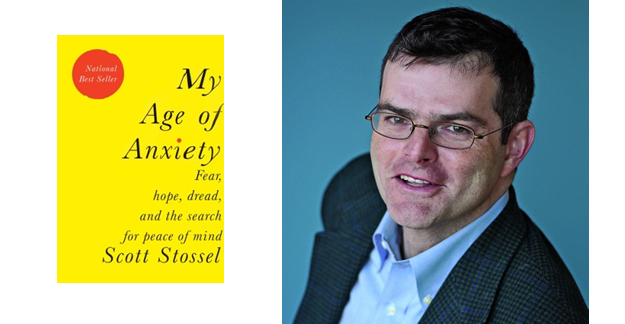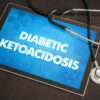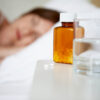Scott Stossel knows about prescription drugs and their side effects. Since the age of 10, he has been treated with a cornucopia of medicines to address severe anxiety caused by a long list of phobias, including separation anxiety, fear of vomiting, flying, and vomiting while flying and, less common, cheese.
The drugs he was prescribed, some of which proved helpful at least for a time, have also caused him to experience everything from extreme heart palpitations and fatigue to suicidal thoughts, blurred vision and the inability to urinate.
After managing his anxieties for more than three decades, Stossel, now 45, has written a well-received book about his chronic condition called My Age of Anxiety: Fear, Hope, Dread, and the Search for Peace of Mind (Knopf) (Amazon | B+N).
Given that 1 in 7 Americans experiences anxiety-related disorders, it’s not surprising that My Age of Anxiety landed on the New York Times Best Sellers list. The book chronicles Stossel’s sometimes perilous and always uncertain path, interweaving it with advice on the topic from the earliest medical reports from Hippocrates, who practiced in 4th century B.C. Greece, to the teachings of the top minds in behavioral sciences today, such as David H. Barlow at Boston University.
Stossel, the editor of The Atlantic and the author of Sarge: The Life and Times of Sargent Shriver (Smithsonian), recently sat down with MedShadow writer Michelle Lodge at his Washington, D.C., office to discuss anxiety, the book and how the prescribed drugs he’s taken have both helped and hindered him.
Q. Is My Age of Anxiety the book you planned to write?
Not exactly. After my first editor at Knopf, Marty Asher, read the pages, he urged me to put more of my own experience, and my own anxiety, into the book (my therapist, Dr. W., was telling me the same thing). I was just trying to keep my editor engaged.
Q. Any regrets about including so much personal stuff?
Right after I published it, I thought, What have I done? I can’t get the genie back in.
Q. And now?
I’m happy that that the book has given some people hope. I get letters thanking me for writing about anxiety. Some of them say they’ve asked their doctors or psychiatrists to read my book. In other cases, psychiatrists are recommending it to their patients or suggesting family members of those with anxiety read it so they understand what their relative is going through. The third category are letters from people who claim they got better by, for example, trying a new diet or having eye surgery or smoking pot.
Q. Do your readers ask for advice?
They do, and I tell them I’m not an expert. I refer them to places where they can get help, like the Anxiety and Depression Association of America and the Child Mind Institute.
Q. What did you hear from your colleagues?
Several of them said they had no idea that I suffered from anxiety, and some wanted to give me a hug — that was awkward. Others apologized if they had ever made me feel anxiety.
Q. What drugs do you believe have helped you the most and why? Which have harmed you the most?
In terms of managing acute anxiety on a short-term basis, benzodiazepines — especially Valium, Xanax, Klonopin and Ativan — have been the most effective. But none of them have reduced my baseline level of anxiety. (I also worry they may be dulling my cognitive sharpness and ruining my memory. Mixed with alcohol, they really wreak havoc with my memory and, sometimes, my inhibitions in nonproductive ways.) Paxil, for about 9 months, seemed like a miracle drug, side effects notwithstanding. It seemed to dramatically reduce my anxiety symptoms. I was happier and traveled more freely than perhaps any time before or since. But then it stopped working, and the withdrawal experience was wretched. I can’t really assess which have harmed me the most. Thorazine had miserable side effects and shattered my athletic confidence — but it may have kept me out of a psychiatric hospital and allowed me to complete 7th grade. Effexor’s side effects felt scary, and the drug didn’t have any positive benefit for me — but I don’t know that it did any long-term harm. So my views on all this are rather ambiguous and complex.
Q. What were the side effects of the drugs you have taken?
In brief: Thorazine: horrific constipation, exhaustion, general psychomotor sedation, dry mouth, twitchy fingers, fogginess. Effexor: akathisia [an inner restlessness that makes it hard to sit still], elevated anxiety, blurred vision. Paxil/Prozac: constipation, bowel irregularity, sexual side effects. Nardil: terror of having a stroke from eating the wrong foods. Norpramin: elevated heart rate during exercise.
Q. Is there any one day or period you don’t want to relive?
Paxil withdrawal was pretty bad — as was the experiment with Effexor that followed it. I wouldn’t want to live through either of those due to the sheer physical and psychological misery they caused. But even more acute — though briefer — were two plane flights I took: one from Boston to Seattle in 1995, and one from Boston to D.C. in 1997. I had panic attacks so severe that I honestly believe I was not far from screaming at the flight attendants that we needed to make an emergency landing, or trying to open the emergency exit so I could get out of the plane — even though we were at 35,000 feet. If I’d had cyanide pills, I might well have taken them. The anxiety I experienced felt just unbearable.
Q. You’ve been on Celexa (citalopram) for over a decade with relatively minor side effects. Have you considered getting off it—and all drugs?
I would ideally like to be medication-free, for lots of reasons (cost; fear of escalating dependency on benzos; fear about long-term effects on my brain; side effects; the desire to feel that I can rely on myself, rather than externally introduced chemical assistance, to get through life and to cope with my anxiety). But I’m afraid to wean off the Celexa for fear that doing so would lead to withdrawal symptoms in the short term and/or to a resurgence of anxiety or depression in the medium or long term. As I write in the book, I’m somewhat scarred by my last attempt to go off medication 11 years ago, when I weaned myself off Paxil. But I do plan at some point, when external stressors are at a relative low, to try to carefully reduce my Celexa dosage and see what happens. (Of course, I’ve been hoping for a stress-free period in which to attempt this for years and it never seems to arrive. Maybe late this summer.)
Q. At what age did you realize that your phobias may be greater than those of your peers? Was there an incident that brought your condition to the fore?
I was conscious of often feeling miserable and anxious from about the age of 4 or 5. But I don’t think I had any awareness of whether I was more or less anxious than my peers until I was around 6 or 7 or 8, when a series of embarrassing events made clear that I had fears my friends did not share.
For instance, at age 6, I was the only kid in my Osage tribe at summer camp who was afraid (and who refused) to get into the adult-size pool. I was (or felt like I was) the only kid at various other camps who would burst randomly into tears during the day because I felt homesick and wanted my mommy. (And these were day camps.) I knew my friends would sleep over at each other’s houses — that was too scary for me. And, as I discuss in the book, my first visits to baseball practice and soccer practice ended with me in tears, refusing to join the other boys in drills, because I felt overwhelmed and confused and anxious. (This despite being a pretty athletic kid.) By the time I was in 3rd and 4th grades, I had become pretty well aware that my emetophobia [fear of vomiting] was something that not everyone shared.
Q. In the 7th and 8th grades you experienced a lot of changes, both in your athletic abilities and sense of well-being and in your reactions to drugs prescribed for anxiety. What was that like?
As a 7th-grade soccer player, before my anxiety intensified severely later that year, I felt confident and enjoyed playing the sport a lot. I was quite quick and reasonably skillful, so I was probably one of the better players on my team.
As I say in the book, when I showed up for tryouts the following year, now taking sizable doses of both Thorazine and imipramine, the coaches were baffled. I’d lost my competitive advantage (speed) and I would get exhausted and dehydrated very quickly. In 7th grade, when the team would go on half-mile runs, I would usually finish among the first five runners out of, say, 30. In 8th grade, I would almost always finish last on such runs. (I’d be completely parched, and a gluey, white mucous would accumulate in the corners of my mouth.) This shattered my confidence, and I was never the same player again, even though by 9th grade I was no longer taking Thorazine and imipramine anymore. I lost my desire to play, and my edge. Even in 7th grade, when I was still admired by my peers for my soccer prowess, anxiety dogged me; I would carry coins in my socks, in case I needed to run off the field to a pay phone and call my mother. At the end of practice, I’d always be shaking very stinky dimes out from between my toes.
Q: Talk about your family’s history of anxiety.
Going back a few generations, my great-grandfather, Chester Hanford, who died when I was 6, led both an accomplished life and one marked by debilitating neuroses, such as nervousness, fear of public speaking, a tendency to procrastinate and relentless self-criticism.
‘My great-grandfather, for many years the dean of students at Harvard, was in the 1940s admitted to McLean Hospital, the famous mental institution in Belmont, Massachusetts, suffering from acute anxiety. The last thirty years of his life were often agony. Though medication and electroshock treatments would bring remissions in his suffering, such respites were temporary, and in his darkest moments in the 1960s he was reduced to a fetal ball in his bedroom, producing what my parents recall as an inhuman-sounding moaning.’ — from My Age of Anxiety
My two children each have some of the same phobias I do, even though I though I didn’t let on about my fears to them. My 10-year-old daughter, Maren, is afraid of flying (aerophobia) and of vomiting. My 7-year-old son, Nathaniel, has had some cognitive behavioral therapy (CBT) treatment for his separation anxiety and for his propensity for worry and catastrophizing. But he’s not cured and we need to put him back in therapy. My daughter, on the other hand, has had her emetophobia “substantially” reduced by CBT; her phobia is at the very least in remission, if not completely cured.
Q. You were prescribed drugs at a young age. What are your thoughts on your own children taking medicine for their phobias?
I’m not rigidly, ideologically opposed. If their misery became acute enough, and if doctors I trusted advised medicating them, I might do so. But in general I think that: a) all things being equal, the drugs tend to treat only the symptoms, not the underlying disorder; b) treating anxiety and other disorders through things like cognitive behavioral therapy is safer, better, longer lasting, and more free of side effects than medication; c) researchers still don’t really have a great sense of what the long-term use of psychiatric medications do to our brains — and in particular to young, still-developing brains; d) we don’t want to increase the risk of drug dependency (either psychological or physiological) if we don’t have to; e) in general, I think kids (and non-kids) feel better about themselves and have a greater sense of self-efficacy if they can learn to manage their anxiety or behavior without resort to medication. As I say, though, one can imagine situations in which I would decide to have them try medication; I hope I don’t have to.
Q. What has surprised you the most in your research on anxiety?
One is that genetics are of major importance in determining psychological makeup. In my case, I thought I developed phobias because my mother denied me outward expressions of unconditional love and was extremely overprotective.
Based on my reading of the research literature, and of my explorations into my own family history, I think genes generally play the primary — though not the sole — role in propagating one’s emotional composition. Parenting and life circumstances also matter a lot—and one can always, to some degree, transcend or overcome one’s genetic inheritance. But I do believe that, in general, genes play the largest role in programming one’s predisposition to experiencing acute or clinical anxiety.
Q. What else was a revelation for you?
I was surprised at how accidental some of the discoveries were. They were testing a drug or a substance for one purpose and then they found out that it relieved anxiety or lowered stress.
Q. Did all the public speaking and flying you had to do on the tour for your first book raise your anxiety level?
My anxiety level varied considerably depending on how much Xanax I took. I did a few interviews (mostly radio shows and small-time cable shows) for which I under-medicated, intentionally trying (at the guidance of my cognitive behavioral therapist) to prove that I needn’t be dependent on medication for performance. Those went poorly: I would feel hot and tingly, and sometimes begin sweating heavily, and my answers tended to be stilted and wooden.
A book-tour trip to Chicago may be more representative. One day included two radio-show appearances and a lunchtime address to several hundred lawyers, which petrified me. The evening before, I met with the event organizers for drinks, and I was so nervous — trembling and dyspeptic and sweating — that it was a real effort to conceal my anxiety. That night was miserable — I was sleepless with anxiety because I kept thinking that if I could barely hold myself together to talk to those friendly organizers, how could I survive a formal presentation in front of hundreds, including Congressmen and a Senator, whom I feared would all be judging me.
The next morning I took Xanax and did an early-AM radio show, which went okay. Then I went back to my hotel room to work on my speech, suffused with dread. I took another Xanax, then made my way to the hotel ballroom where the speech was to be. I met with the organizers as people mingled pre-lunch — but then had to excuse myself to go to the restroom, because I was so anxious and miserable and was sure I would not be able to get through the speech. I took another Xanax (my third), tried to do deep-breathing exercises, then came back to the table for lunch. Wine was served, and seeking to take the edge off my still-intense anxiety, I quaffed a glass and a half, both craving relief from my anxiety but also worrying about what the effect of combining the benzodiazepine medication with alcohol might be. I think this was my first desperation-fueled experience in combining the two.
My anxiety diminished a bit over the course of the lunch — probably because of the cumulative Xanax and alcohol kicking in, but also because I was engagingly distracted by talking to Senator Dick Durbin [D-Ill.] — but then it surged again as I was summoned to the podium for my talk. As is often the case, I had a moment right at the start where I didn’t know if I would be able to get any words out before fainting, vomiting or lapsing into chest-constricted silence and having to run off stage. (This had happened twice at work events the previous year.) But once I got a paragraph or so in, I relaxed and got through it.
After lunch, I felt tremendously relieved but had to do one more NPR radio show. I felt as relaxed as I ever had in such a situation, and the interview went very well. Even though I’d consumed a lot of Xanax and a small amount of alcohol, I felt like my thoughts flowed more smoothly than when derailed/inhibited by anxiety. I flew home that night, relieved to have survived the trip. But then the next morning at our staff-wide editorial meeting at the magazine, I found myself fighting panic attacks, most likely the result of my usual social anxiety combined with a rebound effect from the Xanax I’d taken the day before.
Michelle Lodge is a digital and print journalist, whose articles have appeared in Time and the British Medical Journal and on CNBC.com and Barrons.com.
Photo of Scott Stossel by Michael Lionstar






